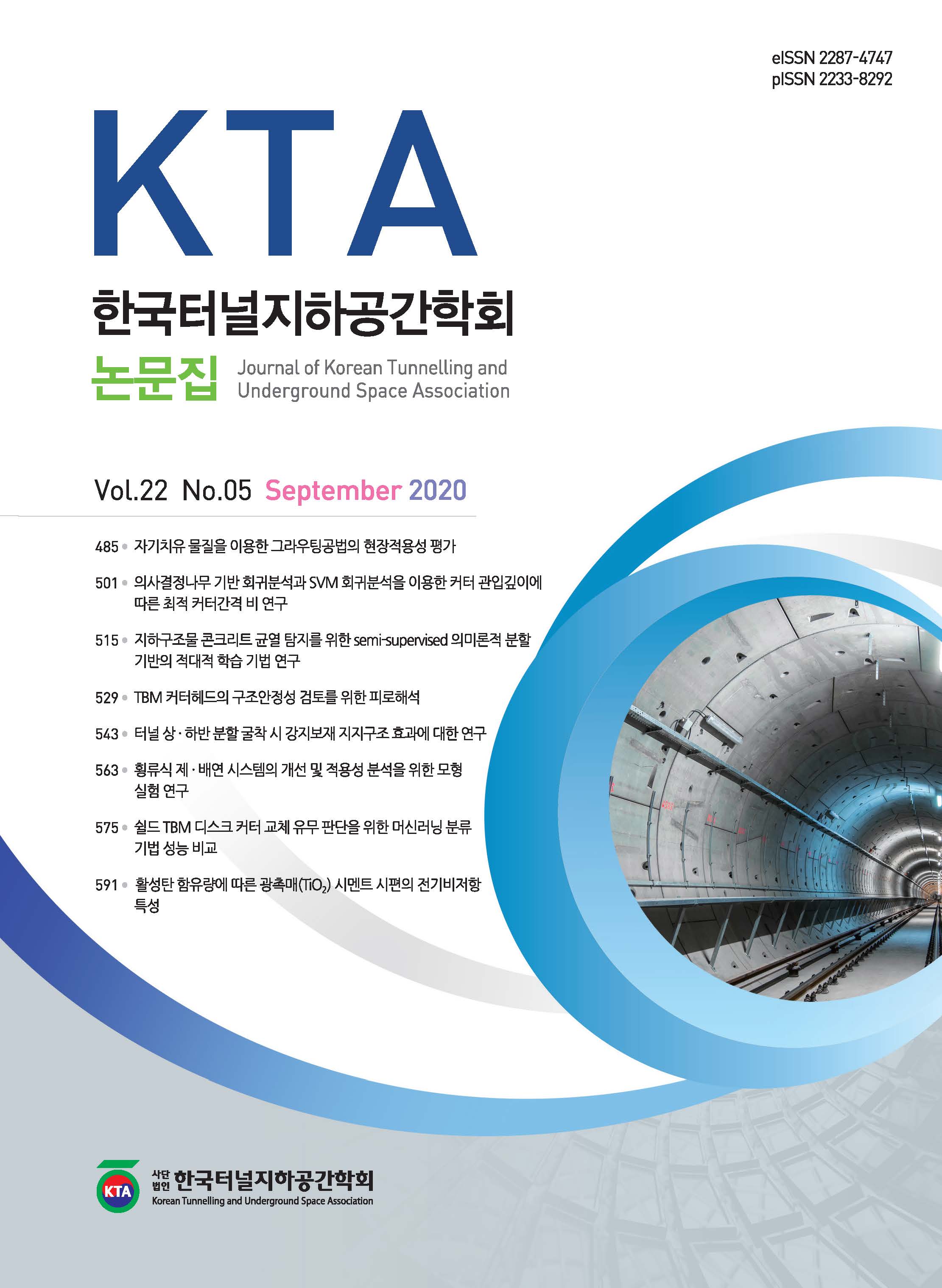(사)한국터널지하공간학회
- Log In/Sign Up
- P-ISSN2233-8292
- E-ISSN2287-4747
- KCI
 ISSN : 2233-8292
ISSN : 2233-8292
Article Contents
- 2024 (Vol.26)
- 2023 (Vol.25)
- 2022 (Vol.24)
- 2021 (Vol.23)
- 2020 (Vol.22)
- 2019 (Vol.21)
- 2018 (Vol.20)
- 2017 (Vol.19)
- 2016 (Vol.18)
- 2015 (Vol.17)
- 2014 (Vol.16)
- 2013 (Vol.15)
- 2012 (Vol.14)
- 2011 (Vol.13)
- 2010 (Vol.12)
- 2009 (Vol.11)
- 2008 (Vol.10)
- 2007 (Vol.9)
- 2006 (Vol.8)
- 2005 (Vol.7)
- 2004 (Vol.6)
- 2003 (Vol.5)
- 2002 (Vol.4)
- 2001 (Vol.3)
A study on the evaluation method and reinforcement effect of face bolt for the stability of a tunnel face by a three dimensional numerical analysis
- Downloaded
- Viewed
Abstract
Tunnel excavation with several sections and appropriate auxiliary measures such as face bolt and pre-grouting are widely used in case of weak and less rigid ground for the stability of a tunnel face during excavation. This papers first described the evaluation methods proposed in technical literature to maintain the tunnel face stable, and then studied by FEM analysis whether face reinforcement is need in what degree of ground deformation and strength features for the stability of a tunnel face when excavating by full excavation with sub-bench. Lastly, a three dimensional FEM analysis was performed to study how the tunnel face itself and the ground around the tunnel behave depending on different bolt layouts, length of bolts, number of bolts. There were relative differences in comparison of results on the stability of a tunnel face by a theoretical evaluation methods and FEM analysis, but the same in reinforced effect of face. It was found that the stability of a tunnel face can be obtained with face bolt installed longer than 1.0D (tunnel width), bolt density of about 1 bolt per every 1.5 ㎡ (layout of grid type), and reinforcement area of 120° arch area of upper section.
- keywords
- Stability of a tunnel face, evaluation method for tunnel stability, face bolt, 막장안정성, 막장안정 평가기법, 막장볼트
Reference
1. 김영수, 이재호, 문총득, 김광일 (2008), 정량적인 막장안정성 평가 기법을 이용한 NATM터널의 보강공법평가, 한국지반공학회, Vol. 24, No. 2 pp. 35-45.
2. 김성열, 윤지선 (2008), FEM해석에 의한 막장볼트 및보조벤치의 막장안정성 효과에 관한 연구, 터널과 지하공간, 제18권 6호, pp. 1-9.
3. 남기천, 허 영, 유광호 (2003), 파쇄대 암반에서 얕은 심도의 터널 굴착 시 막장 보강효과에 관한 연구, 터널기술, 제5권 제 4호, pp. 323-336.
4. 도덕현, 이재현, 고재만 (2003), 암반공동의 설계와 시공, pp. 98-106, 건설정보사.
5. 박도현, 김영근 (2007), 암반능력의 분포특성을 고려한터널거동분석에 관한 연구, 터널기술, 제9권 3호, p. 280.
6. 배성호, 김재민, 김장순, 박의섭 (2007), 국내 암반 초기응력의 전반적 분포특성과 공학적 중요성, 춘계 지질과학기술 공동 학술대회, pp. 310-312.
7. 유충식, 신현강 (2000), 수평 보강재로 보강된 터널막장의 거동, 터널기술, pp. 130-138.
8. 윤지선 (2005), 토목지질학, pp. 235-241, 미래기술.
9. Barton, N. and Bieniaski, Z.T. (2008), KMR and Q-setting records straight, tunnels &tunnelling international, February,pp. 26-29.
10. Peila, D., Oreste, P.P. and Pelizza, S. (1996), “Study of the influence of sub-horrizontal fiber glass pipes on the stability”, Proc. Int. Conf. on North American Tunneling 96, Vol. 1, pp. 425-431.
11. 岩井勝彦・中田雅博・矢野寬 (1998), トンネル切羽安定性の評價手法に關する一考察,トンネルと地 下, Vol.29, No. 3, pp. 41-48.
12. 東博秋・早瀨邦仁・淺井貞一 (1998), ため池の点在する地域を小かぶり施工,トンネルと地下, Vol. 29, No.8, pp. 19-27.
13. 申僖淳・鮮于椿・李斗禾 (2004), 토목기술자를 위한 地質調査 및 岩盤分類, pp. 221-238, 구미서관.
14. 道廣一利・吉岡尙也 (2002), 鏡止めボるトの作用效果を三次元 FEMで解析,トンネルと地下, 第33卷, 6号,pp. 43-48.
15. 櫻井宏親・道廣一利・吉岡尙也 (2000), 鏡止めボるトたする變位抑制に關する數値解析的 硏究, 第10回トンネル工學硏究發表會, pp. 33-38.
16. 徐景源 (2006), 新たな切羽ボルトの打設パタン關する硏究, pp. 151-180.
- Downloaded
- Viewed
- 0KCI Citations
- 0WOS Citations
